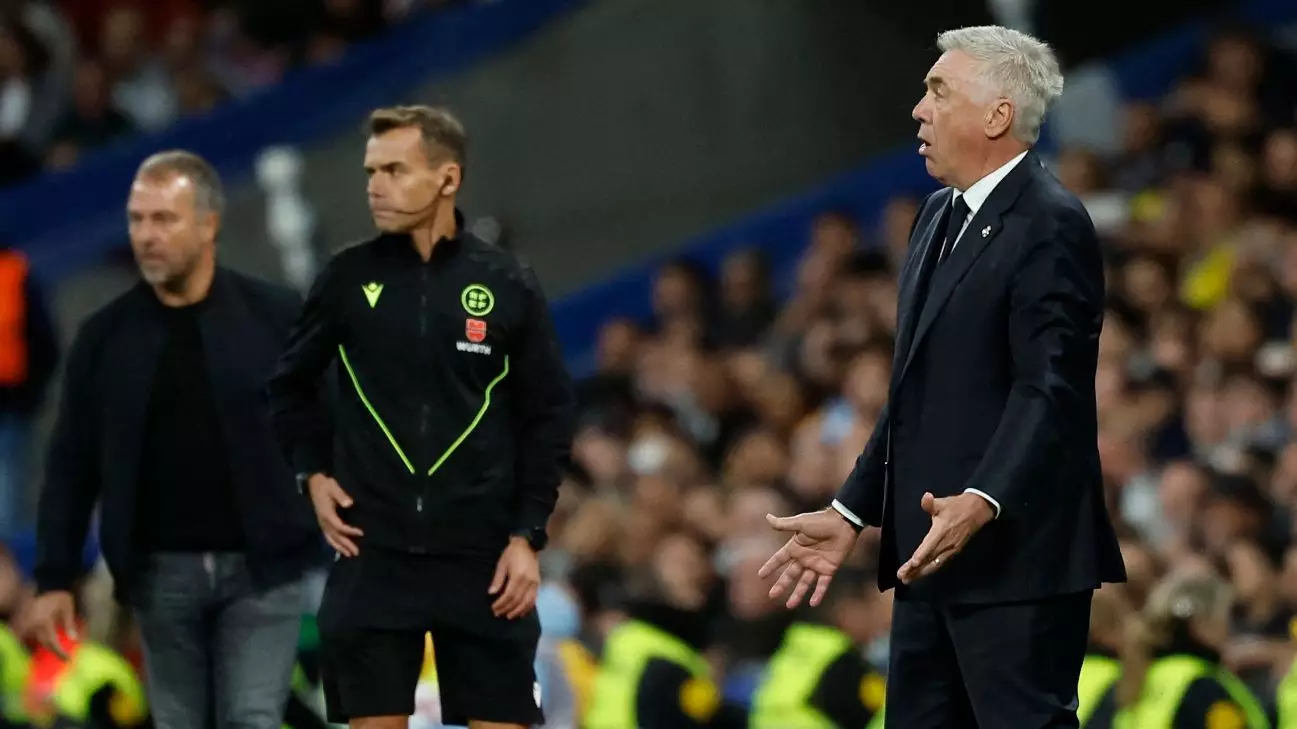El Clásico, the highly anticipated showdown between arch-rivals Real Madrid and Barcelona, recently unfolded in a dramatic fashion, with Barcelona emerging victorious 4-0 at Santiago Bernabéu. This match signified a turning point in both teams’ seasons, emphasizing the tense dynamics between the two clubs and the emotional volatility that often accompanies such high-stakes confrontations. In the wake of this defeat, Real Madrid’s coach Carlo Ancelotti has voiced his dissatisfaction not just with the result but also with the conduct of Barcelona’s bench.
A Clash of Titans: The Rise and Fall of Madrid’s Ambitions
Despite the heavy scoreline, Ancelotti’s comments highlighted an important aspect of team sports: the ethics of celebration amid competition. Following Raphinha’s goal, which capped off a resounding performance for Barcelona, Madrid’s bench found itself in a contentious moment as Barcelona’s bench erupted in jubilation. According to Ancelotti, the conduct of one of Hansi Flick’s assistants crossed a line. This incident illuminates the pressures and passions that arise in a fierce rivalry, suggesting that while elation is natural in sports, it should not come at the expense of sportsmanship.
Real Madrid entered this match with the ambition of extending an impressive unbeaten run, yet the aftermath saw them bereft of their momentum. Ancelotti tactfully pointed out that the first half showcased a relatively balanced game, where Madrid had opportunities. However, once Barcelona gained the lead, the dynamics shifted dramatically, showcasing how psychological momentum can influence performance. The initial parity evaporated, and Madrid, unfortunately, experienced a collapse that led to Barcelona capitalizing on their counter-attacking prowess.
Following the match, Ancelotti encouraged his players not to dwell on the catastrophic second half but rather to reflect on their performance in the first. His remarks emphasize a crucial part of sports psychology: learning from failures is often a faster route to success. Ancelotti’s focus on recovery and resilience is pertinent, especially since Madrid has previously bounced back from disappointing performances, like their defeat against Atlético Madrid last season. Such resilience will require not only a tactical re-evaluation but also a mental fortitude to confront the challenges ahead.
Kylian Mbappé’s performance was another topic for analysis. With two goals ruled out for offside and multiple missed chances, his experience serves as a reminder of the thin margins that define matches at this level. Caught offside eight times during the game, Mbappé found it difficult to exploit Barcelona’s high defensive line—this highlights the tactical cat-and-mouse nature between attackers and defenders. Ancelotti’s admission that risks were taken with Mbappé’s positioning underscores the complexity of strategic decisions in real-time match scenarios.
On the other side of the pitch, Barcelona enjoyed a week marked by triumph, not just in this match but also with their recent victory over Bayern Munich. Under Hansi Flick, the team has enjoyed considerable success, asserting itself with 12 wins out of 14 matches. Flick’s cautious optimism serves as a vital reminder in sports: success should never lead to complacency. His focus is rightly on continuous improvement, which is crucial for sustaining success in a competitive environment.
Flick’s management style seems to foster a sense of confidence among players, allowing talents like Robert Lewandowski and Lamine Yamal to flourish. The youngest Clásico scorer Yamal introduced a new narrative into Barcelona’s legacy, demonstrating that the club is not only looking towards immediate results but also nurturing future stars.
As the league progresses, Barcelona must build on this momentum while remaining grounded, aware that each match presents new challenges. Flick’s emphasis on mindful celebration and maintaining a focus on continual improvement is essential for averting the pitfalls of overconfidence.
The Road Ahead for Both Teams
Moving forward, Real Madrid must take this setback as an opportunity for growth. Ancelotti’s leadership will be pivotal in guiding the team to reassess strategies, focus on defensive solidity, and ensure players are proficient in front of goal. The spirit of resilience must be rekindled, allowing them to remain competitive in the league.
Conversely, Barcelona should capitalize on this victory as a springboard, ensuring that they do not simply revel in past achievements but look toward their next challenges with determination. The psychological interplay between these two football giants will undoubtedly continue to captivate fans and analysts alike, marking the rest of the season with anticipation and excitement.
El Clásico is more than just a match; it is a narrative of rivalry, resilience, and rebirth, where each event adds a chapter to the storied legacies of Real Madrid and Barcelona.

